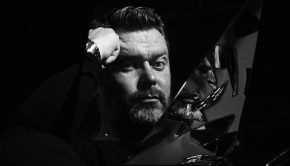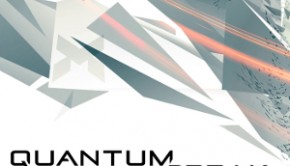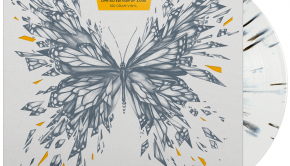John Kaefer Interview: Breaking Instrumental Barriers
A classically trained composer previously known for his work on the Crackle show Sequestered, John Kaefer recently composed the music for the Quantum Break live-action series that accompanied the game of the same name. Although Kaefer often has minimalist vibes infusing his work, he incorporated a large variety of electronic and unusual acoustic techniques for Quantum Break to give the show its sci-fi, futuristic vibe, while still retaining the drama and emotions that lie at the core of the story.
In this interview, John Kaefer speaks about his score to the Quantum Break series, and the road that got him there, including his musical philosophies and inspirations, as well as his work with the creators of the series. Much of the sounds came from specific elements of the story; for example, since the game incorporated junction points which could change elements of the story, part of the challenge in composing for the series was figuring out how to include thematic elements that could account for different possible outcomes. I was very interested to hear Kaefer’s insight into the whole process.
Interview Credits
Interview Subject: John Kaefer
Interviewer: Emily McMillan
Editor: Emily McMillan
Coordination: Emily McMillan, Jordan von Netzer
Interview Content
Emily: Thanks so much for sitting down and speaking with us at Game Music Online!
John Kaefer: My pleasure. Thanks.
Emily: The first thing I wanted to ask was about your musical background – you have a very strong background in your musical education, your graduate education, etc. That’s not always typical with Hollywood composers of many kinds. I was just wondering, how did that impact the start to your career?
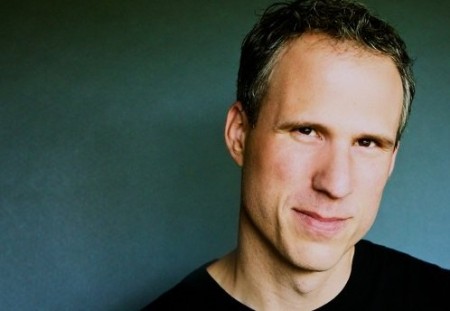
John Kaefer: I started composing when I was young, in 3rd grade at eight years old. It’s something that I’ve always done – it feels instinctual. Regarding my educational background and how I approach scoring, I was lucky to study at fantastic schools with phenomenal composers. This training gave me access to a musical toolbox, a palette of ideas and textures. I try to think outside the box and find my own unique sound for a project, while also working collaboratively.
Emily: Actually, I remember reading that on another interview, where someone was asking about whose sound you try to emulate when you write and you definitely seemed to be very adamant that, saying ‘No, this is my own sound. This is something I’m trying to create and develop on my own individually.’
John Kaefer: Yeah, I’m happiest when I’m writing what I hear in my head. Of course, I’ve done many projects with specific musical references. That’s part of the job. But finding the sound for a project is the really fun part. I feel like it’s up to me to make it work.
Emily: Well, Quantum Break in particular seems to me a little bit different from what you’ve done a lot in the past. Has it been challenging for you to be trying out new synth sounds and electronic instrumentation?
John Kaefer: The most challenging part of Quantum Break wasn’t the actual act of composing, but instead it was the scoring of the junction points – decisions made in-game changed the outcome of the TV series. How do I approach that? How do I approach a similar scene in different ways? How do you get in and out of a scene using the same music at the start and end, but the middle has to be different and hit different moments? In many ways the process was similar to working in TV – I received a locked cut of each episode, discussed the music with the producers and director, and then composed. I approached the Junction Points like a theme and variations – the musical ideas had to be from the same world, but each with little differences that explored a new facet of the story and/or character development. This integration of both video game and TV show is unlike anything that’s been done before. It was really fun.
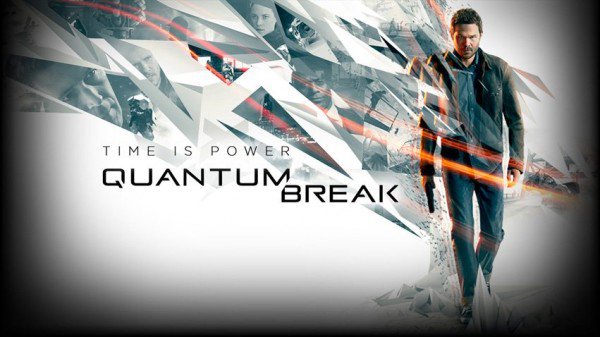
Emily: Did you end up having a lot of discarded music as a result, where you were trying out a few different middles, fill-in music for those types of pieces and then you thought, you know what, actually this isn’t going to work out?
John Kaefer: Yeah, there’s certainly stops and starts while searching for ideas. But I was lucky in that aspect, because we were all so much on the same page, especially director Ben Ketai and I. Towards the end of the project there were few revisions. I’m always try to stayed attuned to the story and atmosphere, and certainly having input from the team helped as well.
Emily: I thought also that you had been talking about how the series director, Ben, he was very easy to work with, that you were on the same page a lot of the time. What makes a director of either a series, game, anything, very easy to work with? What did he say or do with you that made it such a fun project?
John Kaefer: Ben wasn’t as concerned with telling me what notes to write, etc. Rather he focused on character motivations and emotion. Rather than saying, “I want to have an E-flat in the strings,” which does happen sometimes, Ben’s approach was from a storyteller point of view. He was always spot on with where tweaks were needed. I’m always a big fan of having two heads, three heads, just to talk about ideas. It worked well.
Emily: So it’s more helpful for you as a composer when the person that you’re working with, the director, is giving larger themes or character traits or personality, that kind of thing to focus on rather than specific instrumentation.
John Kaefer: Yes, I respond better to talking about ideas versus specific notes. But I can work both ways. If there’s specific musical requests, I can certainly incorporate that. There were technical, dramatic ideas in Quantum Break that came out and that we discussed and I incorporated into it. But again they were, with Quantum Break, they were still put in the context of emotion. It was like this theme perhaps had to be one of the more sinister, and maybe use this kind of grainy, distorted sound. That was totally spot on. That worked. I actually ended up using a bowed vibraphone – like a bow from a string instrument and you kind of press the bow hard, it makes a kind of scraping sound.
Emily: Bowing a vibraphone!
John Kaefer: You can actually put the pedals on a vibraphone and you could bow the sides.
Emily: Oh, I see, okay. You’re sort of repurposing the instrument, then!
John Kaefer: Yeah, absolutely. It doesn’t sound like a percussion instrument, in that it’s struck with a mallet.. It sounds almost like a synthesizer pad, an ethereal sound to it. It’s really cool.
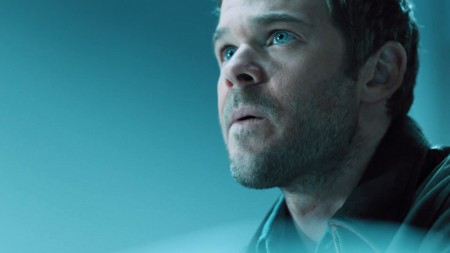
Emily: For this particular project, Quantum Break, you also had to work with another composer. How was that? Did you work closely with each other or did you just get your separate assignments and go your separate ways?
John Kaefer: Pietri was working on the game well before I ever became involved. I worked on my element and he worked on his element, and there was a substantial amount of information that was given to me with regard to how the game looked, how it played, how they wanted it to sound. I admire his work. We didn’t share thematic ideas, but I think both our music comes from the same place.
Emily: During the process, then, were you guys communicating as you were receiving information?
John Kaefer: I communicated with Ben and Lifeboat, who produced the show, as well as a Microsoft producer.
Emily: You were talking about approaching Quantum Break as a kind of minimalist work. What gave you the idea to approach it from that angle musically, once you knew more about as you said the emotions and everything behind the game?
John Kaefer: The show has a moody, ambient vibe to it.
Emily: Yeah, because I was actually going to ask when you were talking about minimalism, I think that term can I guess sometimes be misused or attributed too broadly to a really big slew of composers that do go under that umbrella but actually have very different styles.
John Kaefer: Yeah, if anything I would think of myself, and I don’t necessarily like to use labels but it helps! [laughs] If anything I’m more of a post-minimalist, especially in my current concert musical works. But I think that I also, I’m almost fine with using other things it doesn’t have to be solely minimalism. I try to use everything. But I’m attracted to both. I love very minimal things, I love very minimal ideas. I don’t know why, but I do.
Emily: You said that Steve Reich was the subject of your dissertation?
John Kaefer: Yeah, my connection with Reich I would say stronger with the idea of counterpoint and lines. It’s sometimes hard to see it but I often think in long, long lines, horizontal lines, as opposed to vertical. And something that’s horizontal, say over a period of three or four minutes, it could be a single line that moves in a different way. And Reich often did long lines of counterpoint put together. So it sounds vertical at times, but it actually is very horizontal.
Emily: It’s really an interesting way of looking at it.
John Kaefer: Yeah, hopefully that made sense.
Emily: Yes! I love talking about the actual content of the music of any kind of TV show or game, just because it’s so interesting to see the different way that they’re approached, the different methods used. Have you seen the episodes?
John Kaefer: Yes, I’ve seen them all. It works really well!
Emily: What has it been like since it was released yesterday?
John Kaefer: Yeah, I’ve heard from people who have played it, and they’re digging it. People are responding well to the integration of TV with the game. There’s a lot more insight into character development and their motivations. It seems to be positive so far.
Emily: I mean, I have to say just looking at the imagery of the series, it just looks like it’s a very carefully crafted work artistically.
John Kaefer: Yeah, everyone did a great job.
Emily: Are there any other projects on the horizon for you that you can talk about?
John Kaefer: Yeah, I actually just finished a show called Making Moves. It was created by the writer and director from the Step Up movies. It releases on the FullScreen Network on April 26. I’m also writing a new concert work for the Hollywood Chamber Orchestra and that performance is going to be on July 24 in L.A. That’s a commission from the Hollywood Chamber Orchestra.
Emily: That’s going to be a live performance for the public?
John Kaefer: Yeah, live performance. It’s at the Montalban Theater, 8:00 Sunday, July 24th. There will be ticket information posted on the website and all that stuff, too.
Emily: Was there anything you would like to add to viewers of our website or of your fans who read our website?
John Kaefer: I’m really looking forward to working more in games! It seems like something that I think would be a good fit. Hopefully I’ll have more opportunities.
Posted on April 22, 2016 by Emily McMillan. Last modified on May 3, 2016.

